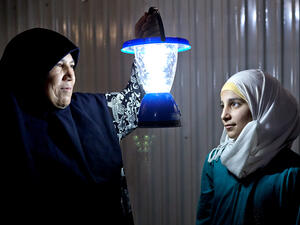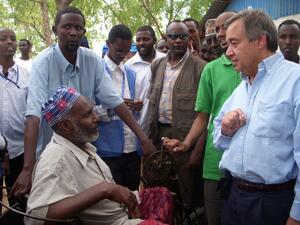Five fires in one month in crowded eastern Chad refugee camps
Five fires in one month in crowded eastern Chad refugee camps
Five accidental fires have swept through parts of two camps for Sudanese refugees in remote eastern Chad in the past four weeks, destroying 291 houses and leaving some 1,455 people homeless. Four of the fires were reported in Djabal camp, near the town of Goz Beijda, and the other in Goz Amer camp, near Koukou. The last two incidents took place on Saturday (14 March) - one in Djabal camp and the other in Goz Amer.
A 9-year old boy lost his life in a fire in Djabal camp on March 2. At least seven refugees have been injured in the fires, one of them severely. The fires destroyed homes and often the refugees' food stocks, personal belongings and livestock. The blazes were caused by poorly tended open fires fanned by heavy winds, causing them to spread rapidly.
Djabal and Goz Amer camps, respectively about 220 km and 250 km south of eastern Chad's capital of Abeche, are both overcrowded. Djabal has a refugee population of nearly 17,000, while Goz Amer has more than 20,000 people. Despite repeated fires in the camps in 2007-08, refugees remain reluctant to construct their shelters with more fire-resistant mud bricks, preferring instead traditional sticks and straw which are tinder dry.
After each fire, UNHCR staff in the two camps immediately distributed family tents and other household items, including plastic sheeting, mats, blankets, jerry cans and kitchen sets to those affected. We continue to stress the need for caution with open cooking fires and are encouraging refugees to build their shelters with more durable materials like mud bricks. UNHCR is seeking an additional $350,000 to carry out a durable shelter strategy in 2009 that will entail fitting the houses of some 1,660 vulnerable families with durable roofing materials not as prone to fire.
A total of 250,000 Sudanese refugees from the Darfur region are hosted in 12 UNHCR-administered refugee camps in eastern Chad, and other 60,000 refugees from the Central African Republic are in five UNHCR-assisted sites in the south of the country.





